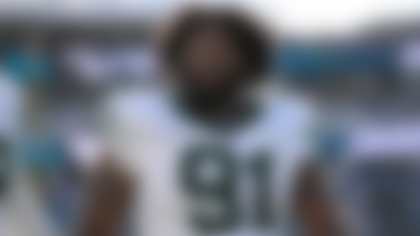Chalk rules. One week after all four home teams won in the Divisional Round, both No. 1 seeds advanced to the Super Bowl for the third straight season.
John Elway left Denver's Super Bowl disappointment two years ago determined to build a different team than the one that was pushed around by Seattle. He succeeded, and now has to face another new-school NFC power that is more balanced and harder to prepare for on offense than any team the AFC has to offer. It's another uphill battle, but few teams in recent NFL history have been better at winning tight games against top-shelf opponents.
Conference Championship Sunday strangely highlighted how important the regular season can be. If New England could have just won once in its final two games, the Patriots would have enjoyed the luxury of facing Denver in Foxborough. Perhaps that could have made a difference in a game where the Broncos defense got off the ball insanely fast in a loud stadium.
Carolina was the most dominant team throughout the regular season, earning the No. 1 seed in the final week of the season. They got out to a quick 17-0 first quarter lead on Sunday and the Cardinals never recovered. It was a day-long celebration in Charlotte, a fitting capper to what has felt like a season-long celebration of all things Cam Newton at home this year. The best player on the best team is going to the biggest game.
It's up to the Broncos to prevent Super Bowl 50 from feeling like a coronation.
- The quarterbacking might not have lived up to the pre-game hype, but Brady vs. Manning XVII proved to be an instant classic. After taking more hits (20) than any quarterback in a single game all season, Tom Brady connected with Rob Gronkowski on a 40-yard strike to convert on fourth-and-10, and followed that up with an improvised touchdown to convert fourth-and-goal, giving the Patriots a chance to tie with 12 seconds remaining. Aqib Talib tipped Brady's rushed pass intended for Julian Edelman, catapulting Peyton Manning into his fourth Super Bowl.
- The Broncos' front seven overwhelmed the Patriots' porous offensive line and destroyed Brady's timing, forcing him to see ghosts in the pocket. Brady's first-half passer rating of 18.1 was the lowest by any postseason quarterback in the past five years. He was off target most of the afternoon, with more than a half-dozen passes underthrown and several more overthrown.
Too explosive for lethargic right tackle Marcus Cannon, Von Miller stole the show with four QB hits, 2.5 sacks, two tackles for loss and an interception while DeMarcus Ware hit Brady a whopping seven times. Channeling J.J. Watt of late, Derek Wolfe contributed four QB hits of his own in addition to a sack and a batted pass. Despite rushing only four and dropping seven into coverage, Denver's pass rushers hit Brady on 36 percent of his dropbacks while Darian Stewart, T.J. Ward and Shiloh Keo made Edelman and Danny Amendola pay on the Patriots' trademark slants and crossing routes over the middle. This was a return of the dominant Denver defense that drew comparisons to the 2000 Ravens earlier in the season.
- Manning will become the first quarterback in NFL history to play in multiple Super Bowls for two different teams. Although he showed improved mobility and engineered one of his most impressive touchdown drives of the season on Denver's first series, Manning was shut down for the final three quarters. His inability to pick up a first down on a pair of late fourth-quarter possessions gave Brady a chance for a potential game-tying touchdown.
- Broncos coach Gary Kubiak was extremely lucky that the NFL's nebulous catch rule resurfaced on a dubious fourth-quarter challenge. Amendola caught a pass, took several steps and had the ball stripped just after his knee touched down. Head official Ed Hochuli ruled that Amendola's catch was not actually a catch, saving Kubiak from a fresh set of downs for the Patriots inside the Broncos' 10-yard line.
- The Patriots sorely missed injured running backs Dion Lewis and LeGarrette Blount. Brady's 11-yard scramble was New England's longest run on a day in which he led the ground "attack" with 13 yards. Steven Jackson was an afterthought, carrying the ball just four times for eight yards. Mismatched against Denver's linebackers, James White came up just short on three crucial fourth-quarter floaters that Patriots fans grew accustomed to seeing Lewis haul in early this season.
*-- Chris Wesseling *
- This was billed as a matchup of the best two teams in the NFL all season, but this was a one-sided affair that showed the depth of the entire Panthers' roster. Carolina's offensive line dominated. Cam Newton made anyone that made a case for Carson Palmer to win MVP look foolish. Ted Ginn, Corey Brown, and Greg Olsen all made big catches. The secondary held up despite injuries, and the Panthers' pass rush forced decisive mistakes. Luke Kuechly added a defensive touchdown.
Cam deserves all the credit for his dominant performance and season. But this Panthers squad has been special from top to bottom. We're just annoyed the Falcons picked them off in Week 16 to ruin a potential undefeated storyline for the Super Bowl.
- With that said, let's talk about Newton. His ever-improving accuracy was on display Sunday on the way to 335 yards on only 28 attempts. He also rushed for 47 yards and two scores, proving again that he's the best red zone runner in football, and the most fearless. His touchdown leap and another third-and-long conversion run on which he trucked Cardinals cornerback Chris Clemons were plays for Newton's career highlight reel.
Panthers home games felt like a season-long celebration. A celebration of a different style of offense than we've truly ever seen. This week they leaned on pocket passing even more than the run game. This was a fitting home finale by the soon-to-be MVP.
- Carson Palmer's six turnovers should not be lost in the shuffle. A few interceptions came late while the Cardinals were in catch-up mode, but Palmer did not look right from the beginning. He did not see the field well, forced passes and missed some routine plays. This was the second straight week Palmer played poorly after a superlative regular season. It's going to be a topic in Arizona until Palmer and this Cardinals team make it back.
- Palmer dropped back to pass 43 times. He finished with 66 adjusted net yards, according to Pro Football Reference. Palmer averaged 8.41 per dropbacks during regular season, and 1.53 in this game. Palmer certainly came up small, but the Panthers defense deserves a ton of credit for making his life miserable.
Kawann Shortt continued his incredible run with a forced fumble. He is one of the top five defensive linemen in the league. Kurt Coleman picked off two passes. Thomas Davis was all over the field until he hurt his arm. Luke Kuechly helped kill drives. And the entire unsung secondary shut down Michael Floyd, Larry Fitzgerald, and John Brown to a combined 80 yards. It is remarkable to see an entire team play so well all at once.
- The Panthers are thought of as a defense-first team, but the offense has led the way in the playoffs. The offensive line gave Newton all day to throw and they still present the most complex running game in the league. Corey Brown's 86-yard touchdown to give the Panthers a 17-0 lead in first quarter felt like a backbreaker. They made the second-best team in the NFL look like slappies.
-- Gregg Rosenthal











